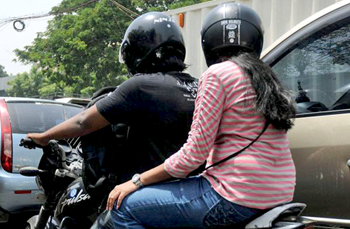Kota (Raj), Jun 19: Rajasthan BJP MLA Bhawani Singh Rajawat has courted controversy by asking people not to wear helmets while riding motorcycles, stating that such protective gear help criminals to flee from police.
 Speaking at a seminar on road safety organised by Centre for Road Safety (CRS) here yesterday, the MLA said that those who do not wish to wear helmets are free to do so.
Speaking at a seminar on road safety organised by Centre for Road Safety (CRS) here yesterday, the MLA said that those who do not wish to wear helmets are free to do so.
Use of protective gear like helmets while riding motorbikes help criminals in fleeing from police, he said, leaving the officials at the seminar stunned.
The Ladpura MLA also termed the helmets as a burden over the head for the people, especially in the scorching heat.
As Yadram Phasal, ASP, Traffic, Kota started giving accounts of deaths in road mishaps in the city mainly caused by not wearing helmets, Rajawat interrupted him and said that governments make laws in air-conditioned rooms.
The MLA went ahead in saying that police were harassing and causing trouble to the people of the city in the name of helmet use.
Rajawat was supported by Kranti Jain, President, Kota Vyapaar Mahasangh who also opposed helmet wearing.
BJP leader Sunita Vyas, Deputy Mayor, Kota Municipal Corporation (KMC) defended the legislator by saying that the MLA was only opposed to helmet wearing on the narrow and congested roads inside Kota city.
Suppressing the embarrassment caused by the remarks of the BJP MLA, ASP Yadram Phasal said everyone has his opinion but laws are made on common conscience unanimously.
There may be some loopholes for practical implementation of a law but all must abide by the rule, he said, adding at least 49 deaths in road accidents occurred in the last three years because of not wearing helmet.
Not new to controversies, Rajawat hit the headlines last year after a video surfaced purportedly showing him threatening voters with consequences if they do not vote for BJP.
Divisional Commissioner Onkaar Singh, SP Kota city Amandeep Singh Kapoor, SP Kota (Rural) Rajendra Singh, former Mayor Suman Shringi and several other officials of various departments and public representatives were present in the seminar.





Comments
Add new comment